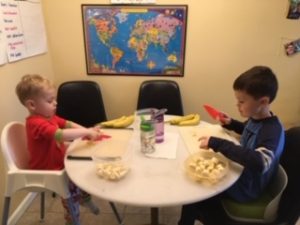We are seven weeks into quarantine, and I remain on a perpetual continuum between homicidal rage and cautious optimism. That might sound overstated, but I am trying to be sincere. The fact of the matter is, none of us are our best selves. We are all walking around simply interacting with each other’s stress responses.
Like many of you, my family is working through furlough, potty training, and the rearrangement of every piece of furniture and aspect of life. I don’t know how much longer I can do this, and I know I have no choice. While I haven’t found many “hacks” during this time, I have had some major realizations. One being that chores will be my crisis school curriculum.
For my family, the most helpful way to manage this transition has been in the framing. In other words, we will experience mourning for what was AND gratitude for what is. They are NOT mutually exclusive. We have to pace ourselves, knowing this is temporary AND long term.
We have to remind ourselves, every day, that we will still work and “go to school” and keep the house, and every single one of those things will look different than it did before. One of the main ways that it looks different is that our boys are doing most of the household chores. Our boys, 3 and 7, have focused their learning mainly on “exercises of practical life” (a subject area in their Montessori school)–they do dishes, chop and prepare food, fold laundry, and so much more.

What
Exercises of practical life (also known as chores) are functional activities typically performed by parents, which children observe but don’t get the opportunity to try–until now! For us, chores are mundane–done out of obligation, not pleasure. To little ones (not teens), chores are interesting and give them the joy to be able to do grown-up work.
Why
Exercises of practical life offer opportunities for constructive childhood development in many ways. They also offer you the help you so desperately need as you now prepare (at least) three meals and two snacks a day in addition to your typical housework and any work that you would normally outsource!
Exercises of Practical Life Build:
- Motor skills: Holding, carrying objects, putting them down carefully, and using specific finger and hand movements are all movements that our kids need to master to do a task like using a dustpan and broom, peeling eggs, cutting vegetables, and folding or rolling clothes. The more opportunities they have to practice, the better they get at controlling their movements.
- Confidence and independence: My oldest, in particular, has become conscious of his abilities and is learning to be independent. He takes pride in his work and (mostly) does not hesitate to offer help.
- Awareness and appreciation: Both of my boys are living less like guests, who have everything taken care of for them. They are living more contributors, taking responsibility, and celebrating the freedom that comes once they do.
- Emotional regulation: Exercises of practical life also can regulate behavioral deviations like fidgeting, attention deficit, and clinginess. The integration of thought and action lead to a sense of calm and self-control. Chores have been especially helpful for our oldest in managing his sensory processing disorder.
How
This may all sound fine and good and also a bit unrealistic or even like a nightmare–who has the time to teach all of these things on top of everything else?!? Isn’t it easier to just do it yourself? Yes and no. I have found that slowing down to teach these things at the start has allowed me to speed up (or just keep pace) as we are all at home for the long haul.
Surrender: Reality bites! Surrender the fantasy of what a “perfectly” folded towel looks like. I am guilty of making a big fuss over how things should be done. No more! If they can do it themselves, they did it correctly! 
Simplify: If you have not given chores before, or if the chore is new to them, give tasks that do not take more than one or two steps to accomplish. Start with letting your little one just do part of the task and build from there.
Show: I used to assume that because my kids see me do this stuff every day, they would instinctively know how to do it. Not at all! Demonstrate, in excruciating detail, step by step. My boys’ ability to perform a task with precision depends on how well I deliberately demonstrate.
For example, you may say “clean the kitchen.” To you, that means to sweep, wipe down the counters, do the dishes–all of it. To your child, that may just mean clear the table. Do it together at first, clarifying expectations all along the way. Celebrate a job well done with free time, an activity together, or a treat.
Equip: As much as possible, give your little one work tools that are physically proportionate to them. Oversized or heavy tools will impede them. We have found so many great tools from silicone knives, to great step stools and child-sized peelers. There are many things for small hands that I never even knew existed.
Teamwork makes the dream work!
What is your crisis school curriculum?









